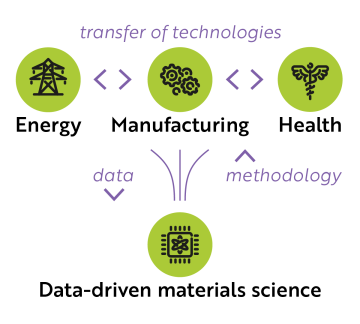Welcome to SUSMAT
The SUSMAT university profiling measure enhances the design of sustainable materials and manufacturing with a data-driven approach to solve global energy, health and well-being, and industrial production challenges.
By integrating engineering, natural sciences, and medical biomaterial science with data digitalization and artificial intelligence, SUSMAT supports cross-disciplinary research across the University of Turku’s three strategic profiling areas: immune-mediated diseases, the evolution of human diversity, and sustainable materials design.
This initiative is one of three profiling areas at the University of Turku selected for funding through the Profi 7 program of the Research Council of Finland. Profi 7 is a competitive national funding instrument designed to strengthen the strategic research focus of Finnish universities. With €12.3 million awarded to the university, the funding enables long-term development, strategic recruitments, and interdisciplinary collaboration.
Thanks to this investment, the University of Turku is advancing its capacity to address complex global challenges through science-based innovation — positioning SUSMAT as a key hub for sustainable technology research.
Themes

Energy
Data-driven development of materials and devices to enable green transition will be significantly accelerated. This, combined with the knowledge of material chemistry and physics in fabrication, functionalisation and characterisation provides rational and tuneable material design for different energy applications such as batteries, solar cells, super capacitors, OLEDs/LEDs and electrocatalysts.
Health
Future healthcare challenges require novel biomaterials and multifunctional delivery vehicles. A rational material design with a combined expertise of organic and inorganic material sciences is needed. A multidisciplinary technology platform will be developed for manufacturing novel drug delivery vehicles, related to targeted extrahepatic delivery, robust sustainable manufacturing, and stable formulation of biological drugs.
Manufacturing
Industry 4.0 is the drive towards rapid change to technology, industries, and manufacturing due to increasing interconnectivity and smart automation, taking advantage of digital manufacturing and digital design (simulations), creative additive manufacturing utilising innovative alloys and coaxial printing. Sustainable production of chemicals and fuels utilising microbiological methods, renewable energy, etc. This approach requires optimisation of re-x (-use, -pair, -furbishing, -cycling).
Data-driven materials science
Emergence of materials science data repositories has ushered in the era of data-driven materials science, but applications to experimental data are stalling. Here, data digitialisation strategies for organising data collection with electronic notebooks, metadata encoding, dataset curation and quality checks are essential. Based on the collected experimental data, we can employ AI algorithms to infer synthesis-property-function relationships and accelerate the discovery of new (sustainable) material compounds, processes and devices.
Steering group

SUSMAT Director
Solar energy materials and devices

SUSMAT Vice-director
AI-driven and computational materials engineering

SUSMAT Steering group member
Porous silicon for drug delivery

SUSMAT Steering group member
Synthetic biopolymers and molecular drug delivery vehicles

